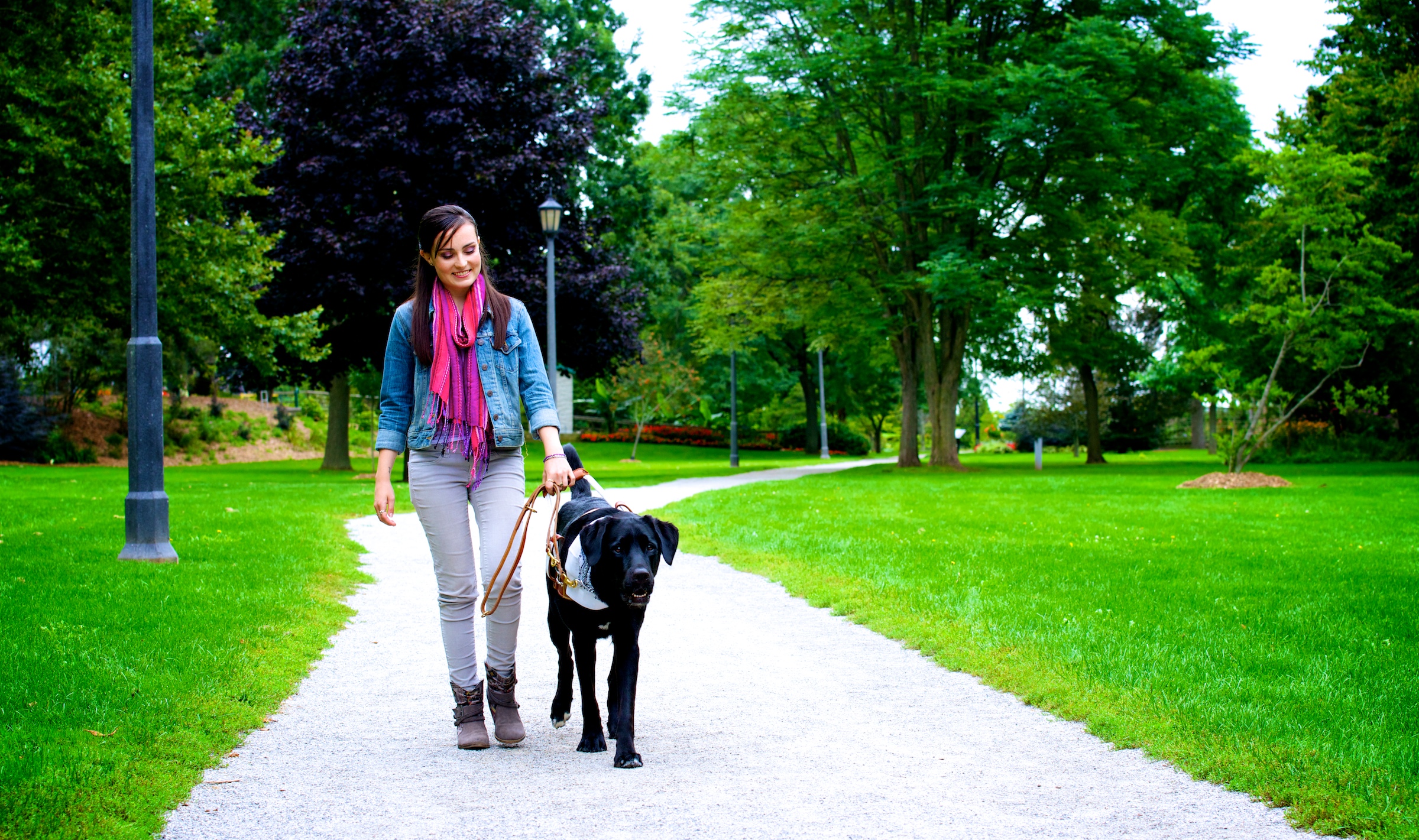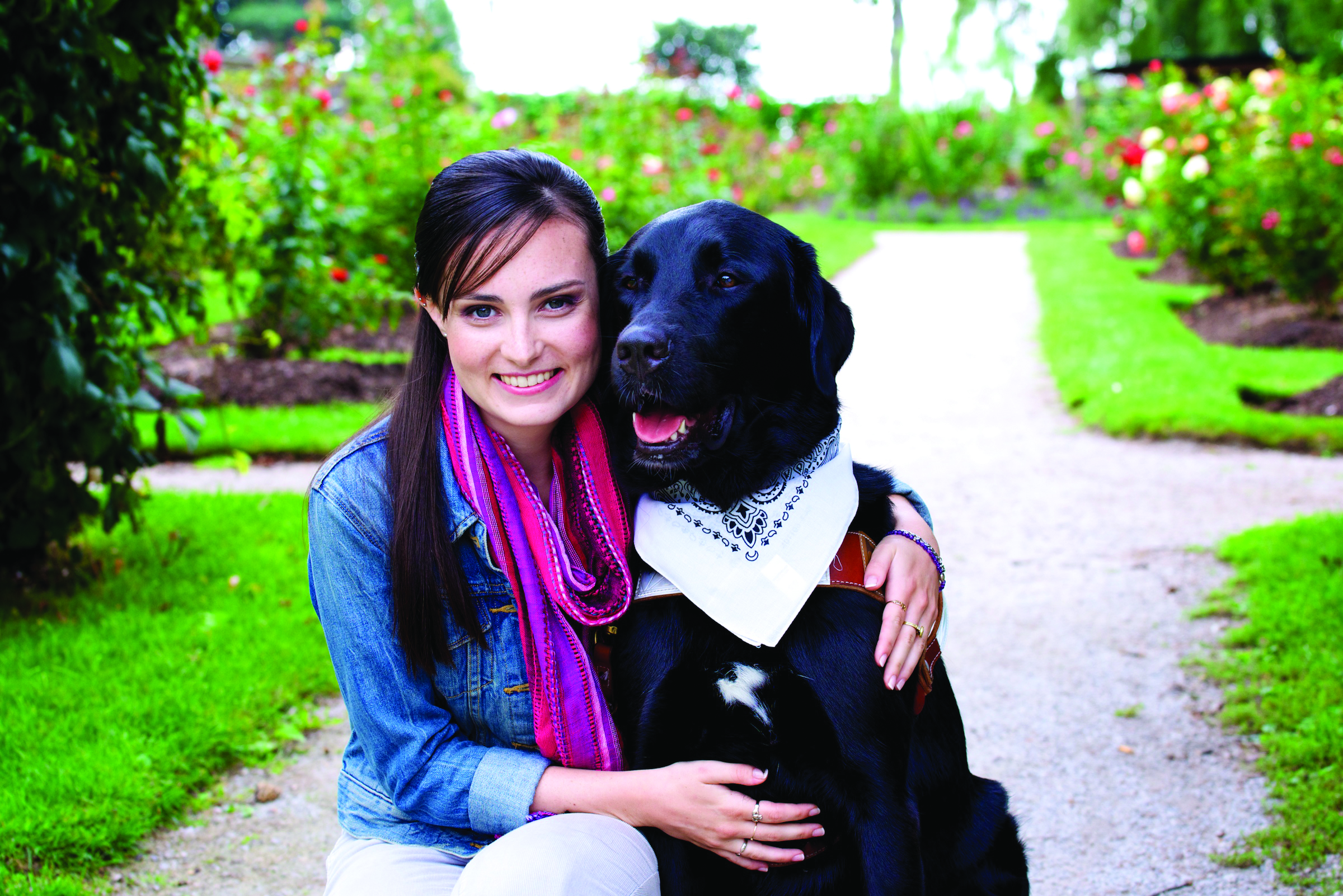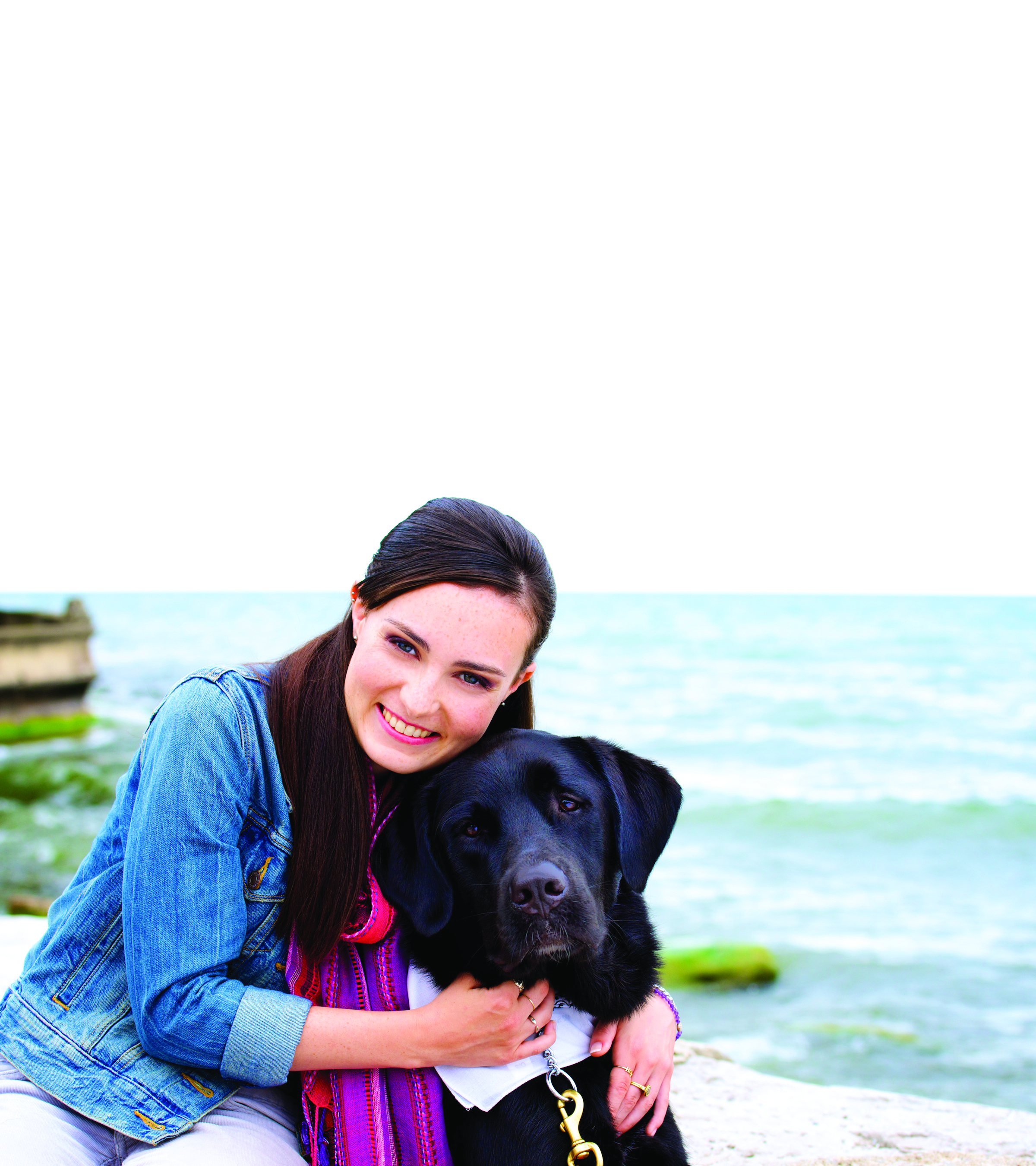Molly Burke
By Tracey Coveart
Molly Burke knew at the tender age of four years old that she would eventually go blind. Diagnosed with retinitis pigmentosa—a degenerative disease that affects the retina of the eye—she began speaking publicly about her condition when she was just five years of age. Looking back at 22, Molly now knows that she was simply reciting the facts, without truly understanding what an emotional and physical impact retinitis pigmentosa would have on her.
Reality hit when Molly’s world went black. She had just started grade 8. “Suddenly, I no longer knew which bottle was the conditioner and which one was the shampoo,” she says. “I couldn’t see myself in the mirror to put on my makeup or get dressed. I couldn’t pour a glass of milk.”
It was a completely new existence, challenging and cruel.
Misunderstood and accused of faking her condition to get attention from classmates and teachers, the youngster was first shunned and then mercilessly bullied. During her graduation trip to Ottawa her former best friends promised to make her look pretty, but instead wrote on her face with makeup and put whipped cream in her hair instead of styling mousse.
Hoping it would help, Molly got her first guide dog, Gypsy, from the Mira Foundation. Things improved, until she ended up on crutches after a fall down a flight of stairs and Gypsy had to stay at home. Once again, Molly had to rely on her peers to guide her. One lunchtime, instead of taking Molly to the cafeteria, the bullies led her outside into the woods, smashed her crutches against a tree, laughed and abandoned her. “I couldn’t see, I couldn’t stand and I didn’t know what to do,” says Molly. “It was devastating. I lost my happiness, my friends and myself when I lost my vision. It was a very dark journey.”
Descending into depression, Molly had started self-harming a few months before that incident as a way of externalizing the pain she was feeling inside. In the woods, she confesses, “I hit rock bottom and began planning my suicide.” Fortunately, Molly’s family recognized her plight and came to her rescue. “It wasn’t a quick or easy fix, but I started taking steps to get better by seeing a psychologist. There was even a crisis number on speed dial on my cellphone, just in case.”
Molly reports that her physical health became a priority, and she sought advice from a nutritionist and began practising yoga. “And I discovered my passion—singing and writing music—which gave me safe and healthy outlet for my emotions.”
Working with the Canadian National Institute for the Blind (CNIB), Molly also began to relearn life skills and regain her independence. Little things, like how to put toothpaste on her toothbrush, pour a glass of milk and apply makeup, helped her to slowly build her confidence and begin to find some enjoyment in life.
Stepping up
Molly recalls her willingness to make a fresh start and her hope of leaving the bullying behind when she enrolled in a school for the blind in grade 9. But the torment returned. And that’s when she had an epiphany. “I realized I wasn’t being bullied because I was different. Rather, there was something in others that was broken and I was simply the target of their hurt and anger.”
Taking matters into her own hands, the teen printed out the hateful Facebook posts and presented them to the principal. “The first time, I ran. This time, I simply had to deal with it,” says Molly, who is now 22 years old and a sought-after public speaker and media personality. “The principal just sat me down with the ‘head’ bully, and encouraged us to talk.” After the meeting, Molly remembers the two of them having lunch together and smiles when she reports that they “remain friends to this day.”
Feel, but don’t dwell
Molly suggests that the world can be a harsh place without sight. To heal psychologically, she had to allow herself to mourn her lost vision. “It’s okay to be sad and angry. It’s important to let yourself feel those things—to ask ‘Why me?’—and to grieve the life you’re losing. But know when enough is enough. You have to learn to accept the things you can’t change.”
Molly became serious about motivational speaking when she was in grade 9 and began telling her story. When she was in grade 12, Craig Kielburger saw her on stage and offered her a position with ME to WE, the organization he co-founded with his brother, Marc. Today, Molly speaks to schools and corporations and at conferences, and on behalf of organizations such as the CNIB and the Foundation Fighting Blindness.
A family affair
Molly’s website, MollyBurke.ca, is a team effort. Her mother Niamh is her “momager,” fielding booking requests and manning the video camera. Her dad Peter—jokingly referred to as “minion”—helps with business management. (Gallop, her second service dog, is director of cuteness and head of security.)
Although she loves being “astereotypical”—Molly is beautiful, petite and “looks” directly at you when she speaks—that hasn’t always worked in her favour. People assume she is sighted and question her authenticity. “They ask why I don’t wear dark glasses or if I’m training my service dog for someone else,” she says. The truth is, Molly relies heavily on her dogs—first Gypsy, who she had for seven years, and now Gallop help her to navigate the world. “Having service dogs has changed my life. They give me confidence and fluidity in movement. Taking responsibility for his or her care—knowing someone needs me to get up—has been huge emotionally. The dogs also make it so easy to start a conversation. After all, no one stops to ask you the name of your cane.”
Molly is now known as an international motivational speaker, and has a weekly television show, a YouTube channel and a popular blog. Molly and Gallop even walked the runway during Startup Fashion Week this year. Put simply, Molly Burke has turned pain into purpose. “I am my own boss,” she says. “I am in control of my life and I love it. I have faced and overcome my challenges and that gives others hope. Reaching out—taking what you’ve been through and helping to change someone else’s life—is very empowering.”
Follow Molly
facebook.com/MollyBurkeOfficial
Molly’s tips to survive and thrive
- Don’t struggle in silence. Reach out for support and you will find it.
- Realize that this is not your whole life; it’s just a stepping-stone. Things really are going to get better. The dark days will end.
- Stand up for yourself. Take an active role in stopping harm and promoting healing.
- Stand up for others. If you can’t physically put yourself in the line of fire, be there emotionally. Offer your support and friendship.
- Speak out if you can. Regain the voice that was stolen from you by your darkness, whether that is bullies, mental illness or disease. Sharing your story is very empowering and has the potential to help others.
Meet one blind person, and you haven’t met them all—you’ve just met one blind person.
When life gives you lemons, you can either chew on them and remain bitter or make lemonade. We all have potential.
Save
Save














